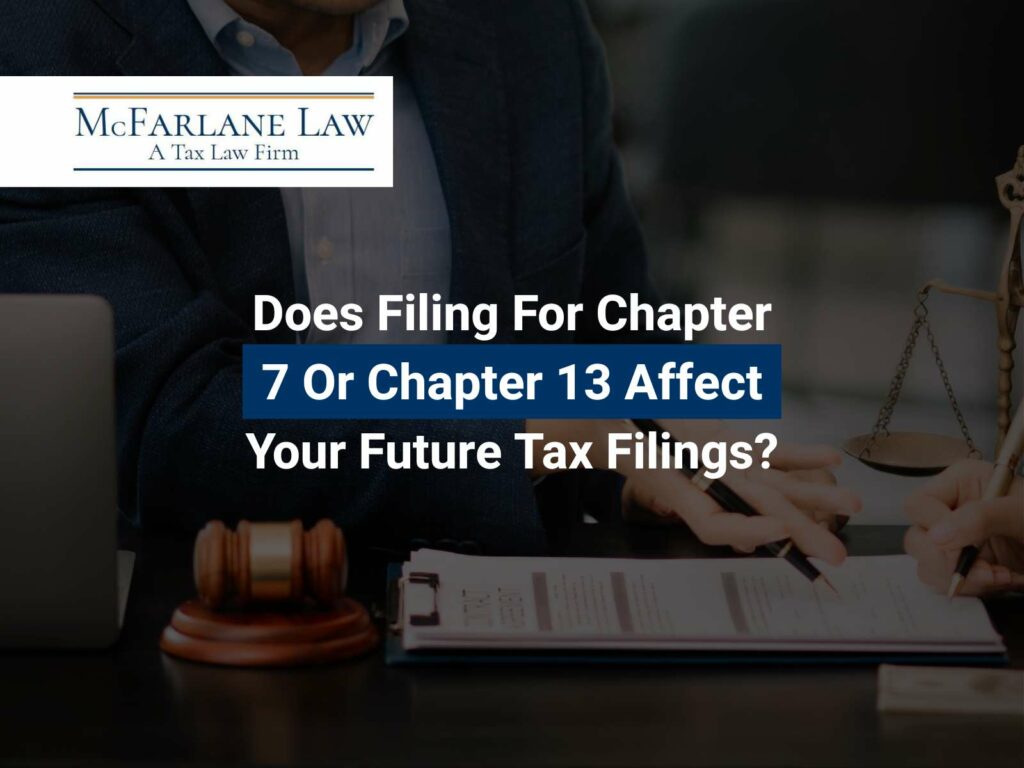Does Filing For Chapter 7 Or Chapter 13 Affect Your Future Tax Filings?

Filing for bankruptcy can be an intimidating process that brings up many questions. However, one of the areas that is often overlooked is how taxes are impacted by your bankruptcy. What will happen to a tax refund? Do you have to file future taxes? How can bankruptcy affect tax debt?
These questions are important and should be addressed by your tax attorneys in Arizona. Some of the answers depend on whether you’re filing for Chapter 13 or Chapter 7 bankruptcy. Some are the same across the board. The following addresses what you need to know about bankruptcy and taxes.

A Brief Overview Of Chapter 13 Bankruptcy & Chapter 7 Bankruptcy
Chapter 7 bankruptcy is known as liquidation bankruptcy. When people think of bankruptcy, this is generally what they think of. In Chapter 7, all of your non-exempt assets will be seized and sold to pay off your secured debts. Once this is complete, the remaining debts will be discharged and you will be given a fresh financial start.
Chapter 13 bankruptcy gives a little more control to the filer and is typically used by someone who has an income that can pay off some debt. In this case, you will come up with a 3-5 year plan to pay off your debts. They will be consolidated and you will pay the bankruptcy trustee who will pay your creditors. This happens until your plan is complete and the remaining debt can be discharged.
Receiving a Tax Refund & Chapter 7 Bankruptcy
Unfortunately, tax refunds are assets that will become a part of your bankruptcy estate and used to pay off creditors. This is true even if you have not received the refund yet. However, your tax attorneys in Arizona may be able to find a way for you to keep the refund through strategic tax planning.
Arizona does not allow any federal exemptions and the state does not provide exemptions for a child tax credit or earned income tax credit. Your best bet at protecting your refund is to wait to file for bankruptcy until you receive it and use it on living expenses. You can spend your return on the following, just keep all your documentation:
- Rent/mortgage
- Utilities
- Food
- Medical bills
- Car payments
- Car repairs
Additionally, Arizona offers a wildcard exemption of $300 per individual or $600 per married couple, which may be applied to cash on hand, bank account balances, or other non-exempt property. Depending on the timing and your financial situation, your attorney might use this exemption to protect a portion of your refund—but its application is limited and varies by case.
For the best outcome, speak with an experienced bankruptcy and tax attorney in Arizona who can help you plan the right timing and strategy based on your specific refund and financial situation.
How Chapter 13 Bankruptcy Affects Your Tax Refund
In Chapter 13 bankruptcy, you will be filing for taxes a few times during the process. You can expect your bankruptcy trustee to look over these returns each year if your return shows a discrepancy in income, such as you’re making more than you were when you filed, your monthly payment could increase.
You will also likely have to use your tax return to pay off creditors. Some repayment plans may allow you to keep your return, but your spending of it will likely be regulated. This is because tax returns are extra income which is generally required to be surrendered to the bankruptcy court.
Similar to Chapter 7 bankruptcy, if the return is used to pay for necessary expenses and it is documented, you may not have to turn it over. You could also talk with your tax attorneys in Arizona about modifying your plan to allow for an irregular income change such as a one-time a year bonus or your tax return.
How Bankruptcy Affects Future Arizona Tax Filings
You are still required to file your taxes every year regardless of your bankruptcy status. For Chapter 13 filers, you will continue to file throughout your 3-5 year payment plan. If you neglect to file or fall behind on your tax payments, your bankruptcy case could be dismissed.
For Chapter 7 filers, you will continue filing your taxes every year as you always have been. As long as your past tax returns were filed accurately, your future taxes should be as expected. If you fall into any tax debt or run into challenges with filing or paying your taxes during your bankruptcy, reach out to your tax attorneys in Arizona right away to ensure your bankruptcy is not affected and to evaluate your options.
Does Bankruptcy Reduce Or Eliminate Tax Debt?
If some of the debt that caused you to file for bankruptcy is tax debt, you may wonder how bankruptcy will affect this debt. Can it be eliminated or reduced? The answer is, sometimes. It will depend on how old the debt is, what kind of taxes you owe, and how you file. The types of taxes that can be discharged are:
- Federal taxes
- Arizona state taxes
- Taxes that meet specific timing rules
Taxes that cannot be discharged include:
- Recent tax debts
- Payroll or trust fund taxes
- Taxes from fraudulent returns
- Unfiled tax returns
- Tax penalties on non-dischargeable taxes
The specific timing rules mentioned above are the 3/2/240 rule. In order to have your income tax debt discharged, your tax return must have been due at least 3 years ago, you must have filed the return at least 2 years ago, and the IRS must have assessed the tax at least 240 days ago. If your taxes fall under this timing rule, it is possible to have the debt discharged under your bankruptcy.
Final Thoughts on Bankruptcy & Tax Filings
In conclusion, while bankruptcy can impact your taxes in various ways, understanding how each chapter works in relation to tax filings is crucial for managing your financial recovery. Whether dealing with tax refunds or understanding the discharge of tax debt, it’s important to be aware of the rules and regulations that apply to your specific situation. Staying informed about your rights and obligations can help ensure a smoother path through the bankruptcy process.
This blog is brought to you by Blake Goodman, PC, Bankruptcy and Debt Relief Attorneys, a trusted bankruptcy law firm in Honolulu, Hawaii, with over 80 years of experience in Chapter 7 and Chapter 13 bankruptcy, debt settlement, and foreclosure defense.
When you need a top Arizona tax lawyer, call:
McFARLANE LAW – A Tax Law Firm
T. 480-991-0032 / e: [email protected]/ net: www.taxlawaz.com
All we do is resolve tax problems! We have years dealing with the local IRS and ADOR agents.
With offices around the Phoenix valley, Tucson, and Flagstaff.
We represent clients at all administrative agency and appeal levels, the Arizona Tax Court, and the federal US Tax Court, and throughout Arizona: Phoenix, Glendale, Peoria, Scottsdale, Mesa, Tempe, Chandler, Queen Creek, Yuma, Casa Grande, Tucson, Sierra Vista, Bisbee, Flagstaff, Prescott, Payson, Coconino County, Yavapai County, Maricopa County, Pima County, Cochise County, Pinal County.